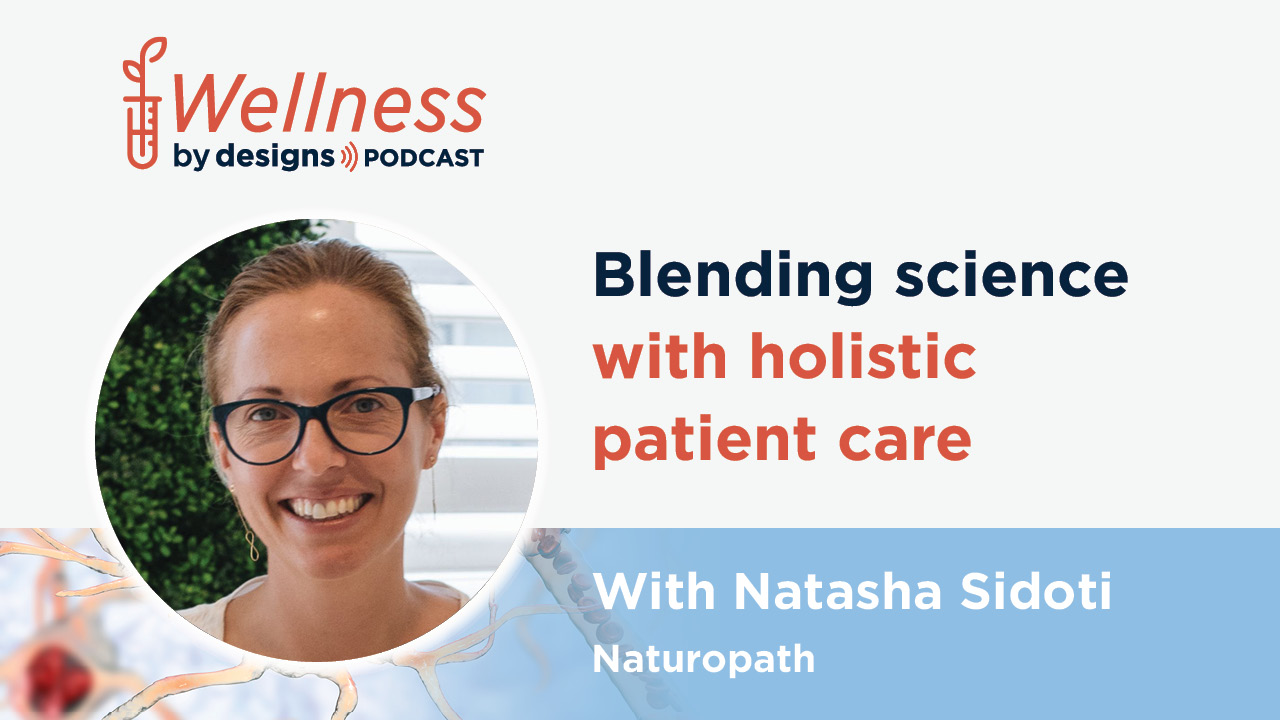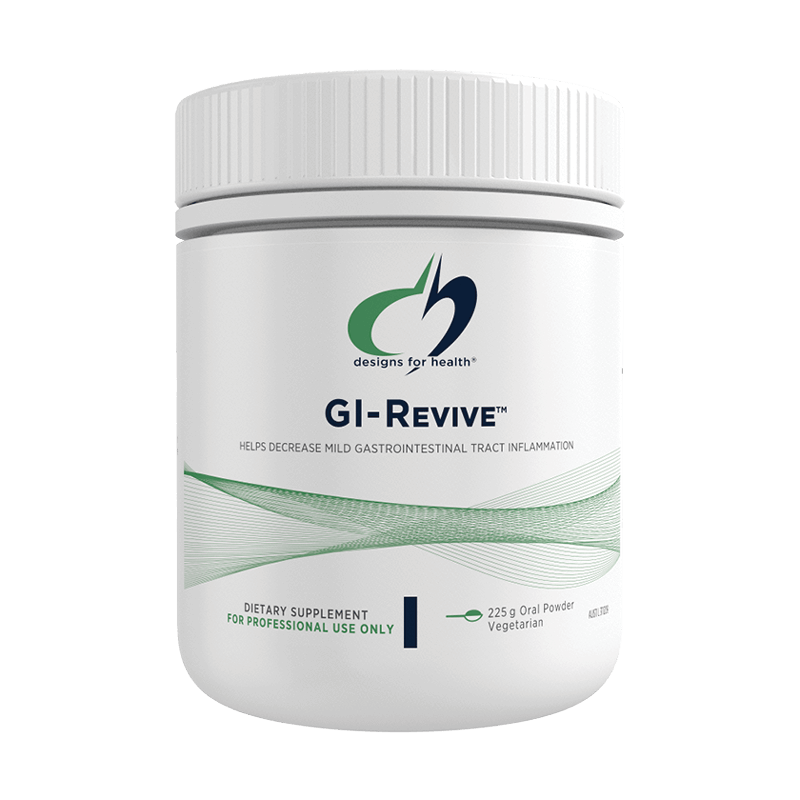

Blending Science with Holistic Patient Care
Today we’re joined by Natasha Sidoti, a naturopath who blends distinctive listening skills and body language cues with modern science to achieve a more telling patient case.
Natasha observes the pattern of languaging and phrasing from a client resulting in some vast clues to what is going on with your patient.
About Natasha:
After realising her cc debt was predominantly from health food stores, Tash decided to return for Uni once more and complete her Bachelor of Health Science in Naturopathy, leaving behind her original career path in Human Resources, Not for Profit work and Office Management.
Her adolescent years were spent in New Zealand, with a step-father who opened her eyes to organic farming and what it means to feel well from the inside out.
Now, Tash has a busy clinical practice in the Northern Beaches of Sydney and also loves speaking with health practitioners across Australia, providing technical support, training and GI-MAP guidance. The best of both worlds!
Over the years, Tash has become increasingly curious about the correlation between client language patterns, gut microbiome markers and digestive clinical symptoms.
This parallel linguistic interest compliments the Naturopathic framework to ‘treat the whole person’, with equal respect to both the verbal descriptives and functional testing biomarkers.
The more we truly listen to what is said, HOW it is phrased and what is UNsaid…. the more we can do for our patients.
Tash appreciates the nuanced detail one can gain from our unique microbes as much as the detail that can be gaged from client communication patterns.
Combining these observations is where the magic can really happen and longer-term, sustainable improvements are possible.
Connect with Natasha:
website: www.natashasidoti.com
Facebook: Natasha Sidoti Naturopath
References:
Transcript
Introduction
Andrew: This is “Wellness by Designs.” And I’m your host, Andrew Whitfield-Cook. Today we’re joined by Natasha Sidoti, a naturopath who believes that we should listen more intently to our patients and the language they use, or else we fall into the trap of treating their symptoms. Welcome to “Wellness by Designs,” Natasha. How are you going?
Natasha: Thank you, Andrew, thank you so much for having me on your wonderful education platform.
Andrew: It is our pleasure. Now, I first got to ask, what exactly are we talking about here? Because we often dialogue with patients. So how attuned do we have to be?
Natasha: As attuned as possible, and it’s very easy to feel like that doesn’t matter in an ever-growing world of functional testing. I was talking to you earlier about how we can often feel pulled in two directions as integrative practitioners, the modern-day naturopath, nutritionist, and integrative health practitioner can feel obliged to really understand all the functional testing that’s now available. And that’s only exploding. Those options are ever-evolving, you can feel an overwhelm of where to focus there. And yet, we’ve also decided to study in this field, because we know that there’s more to it than just compartmentalizing symptoms. So now we need to intersect both in an unprecedented way that’s got all this micro detail, and then zoom out again to the macro and see the whole person and do it all at once in your hour consultation.
Andrew: I mean, that’s no small skill, because, you know, you’re really, you’re scrambling in your brain thinking, what’s the real issue with this patient, symptomatologically. But you’re looking for other things behind.
Natasha: Behind is the word and I really appreciate you using that word, it’s what’s beneath, what’s behind, and often the pattern of languaging and phrasing things from a client, even before you have your stool test, or your blood test, or your organic acids test back, you will start to get some very big clues on the language patterns. And it can be very valuable to reflect them back to the client and see if they’ve observed that there are themes to the way that they’re expressing themselves.
Andrew: Okay, so this is active listening, this is, you know, paraphrasing and things like that, correct?
Natasha: Yes, it’s more than active listening in the sense that you’re also looking for incongruences in body language. Sometimes there’s the unsaid that you can pick up on, you may be physically feeling a response to something the client’s saying, but their words are incongruent with the feeling you have in your body. And it’s to also trust this process, as you’re doing your case taking over and above looking at the blood test over and above looking at, in my case, the gut microbiome qPCR test. It’s been particularly insightful for gut health with clients as there is so many parallels from the micro to the macro, on the markers we can see in a gut microbiome test and some of the language patterns we hear from our clients.
Andrew: Okay, so that’s really interesting, like, I would have thought about being attuned to somebody’s, you know, self-esteem, for instance, or their feeling is of apprehension, whether, you know, hunched shoulders, reserve, crossed arms, body language, that sort of thing. But you’re now correlating things with gut, gut symptoms. And before I continue, I just wanted to ask to make a point qPCR is a quick polymer chain reaction. So it’s a fast PCR test, yeah?
Natasha: Quantitative.
Andrew: Quantitative?
Natasha: Quantitative, yes. So the main difference between PCR and qPCR is the quantification of what’s detected. And so what I like about qPCR, is you get a broader, highly sensitive snapshot. Now, because it’s sensitive. If it’s not looked at in context, we do run the risk of over-treating the markers that come through. So that’s why patterns, once again, we’ve got language patterns from the client, but also gut microbiota patterns need to be looked at as a bird’s eye perspective, to see how things are in proportion to one another before we dive in with our gut protocols, so to speak.
Andrew: Can we delve further into what language patterns are then?
Natasha: Absolutely, I actually decided to write down some examples because I just found this unfolding over the last few years of clinical practice. So something very simple that helps me is when my patients are talking to me, if I hear a poignant phrase, I write it down. And I often write down repeated phrases that can come up through the session and reflect them back to the client. It sounds simple, but it’s amazing how the penny can drop when someone lays the cards out in front of you.
One particularly really interesting case was a patient with dysgeusia, I never know how to pronounce it properly. But over 20 years of a persistent bad taste in her mouth. She had also seen integrative practitioners over the years and done some very good classical gut work around Candida, anti-fungal, SIBO diets, she had done a lot of great groundwork and did experience some symptom relief. I noticed the way she was sitting was very contained. And when I asked her about her voice, and how often she uses it, the response was quite poignant. It was, “I keep to myself, I shut down, my body is used to holding on.” And since she was a child, she had observed her mother, who was very all about group harmony, never about any sort of potentially disruptive opinion, or feedback. So even if it’s something as simple as your opinion on a book or a movie, you may bite your tongue.
So as we were talking about this, I could see her body soften. And this wave across completely wash over her realizing, “Okay, there’s this bad taste in my mouth, and I virtually never express how I feel.”
Andrew: So that would have opened up like a whole conundrum of psychological or psychosocial issues, rather than the physical issues. Do you find, therefore, that much of your time is taken up counselling the patient?
Natasha: Yes, and I think that’s okay because we are trained in counselling. I think it’s okay, to a certain point, and everybody has their own level of comfort with that. This was very much a logical process as well around using your voice and expressing things versus suppressing or repressing them. And we had some very small micro-goals to work on around many moments during her week when she could speak when she normally wouldn’t, nothing big and grandiose, no Joan of Arc moments, it was simple, like ordering something on the menu that she really wanted, not what her partner really wanted, really basic.
Over and above that, we continued the gut work, she had a beautiful tonic with some poke root in there as well, that I absolutely love using for lymphatic and poor taste in the mouth symptoms. And within 4 weeks, it was gone, that terrible, persistent bad taste of over 20 years was gone. So I really value both the gut work and the naming of certain language pattern themes that she was completely unaware of using.
Andrew: Can I ask though, when we’re talking about, and forgive me for harping on this patient, but when you’re taking the patient picture, you’ve got to take into account all of the potential causes of a bad taste. And I’m assuming, when you say bad taste, would that include metallic taste as well? Or a garlicky taste, or what?
Natasha: Correct, yes. Yes.
Andrew: Right, but you’ve then got these…
Natasha: And a lot of that was done.
Andrew: Oh, previously?
Natasha: Yes. Yes. And so it’s so important. I absolutely agree with you that there’s a duty of care there to explore heavy metals, zinc, even B12. And GI-Mapping, which we did do, we did do the gut microbiome mapping. And we did find classic species that are overgrown and intestinal bacterial overgrowth, I just call it EBO versus SIBO. So that was all there. However, that final shift, that final nudge really was achieved through understanding psychopathology.
Andrew: Oh, that’s a really strong word. So I got to ask, though, correlation doesn’t necessarily mean causation. Is there any evidence to link, to show that this changing of belief system if you like, or an approach can change actual physical symptoms, can change disease presentation?
Natasha: It’s a great question. I was reading some papers even just this morning. There’s a really good new one from just this year, 2021. And it was from Research Square on patients with very high anxiety. There were 21 patients. They had high streptococci, high Romboutsia, and low Faecalibacterium prausnitzii, as well as 29 controls, and they all received mindfulness coaching. So this was really fascinating. And there were fantastic improvements to their gut microbiota diversity after mindfulness and meditation interventions.
So I’m not necessarily saying when you change belief systems that there’s a research paper on belief system change in gut microbiota markers. However, we can see plenty of research out there on interventions that have nothing to do with supplements, have nothing to do with dietary changes, and they will still positively impact your gut microbiota. So why not value all of them with a similar weighting? The recent Monash University study by Dr Simone Peters, who is well known for her FODMAPs research has come out with a lovely randomized control trial, they admit that the sample size is smaller. So 24 patients in each of the 3 groups, one was purely receiving gut hypnotherapy, so no nutritional or supplemental intervention, one group was on FODMAPs and the second group was on a combination of the 2. They all reported equal improvement 71%, 72%, 71%.
Andrew: Wow. That’s incredible. Okay, so I’ve got to ask here, are we talking really about here, the gut-brain superhighway? You know, that neurotransmitters… You know, we know that depending on the textbook, or the expert that you listen to anywhere between 90% and 95% of the body’s serotonin is made in the gut, but you’ve also got other receptors for other neurotransmitters as well. Are we, therefore, talking about modification of the bacterial milieu and therefore, potentially symptom presentation, because of the gut-brain highway, and how we are training, I’m gonna say training, our brains to train our gut? Does that work?
Natasha: Yeah, and it can be the chicken or the egg, because a pool of diversity in the gut microbiota will negatively impact our nervous system state, and our mind, and vice versa. So there is no clear research paper that said this is actually where it starts. And then when you change this, this is how you influence it, you can circuit break where you like, but what I’d love to encourage all of my colleagues to do is to circuit break it from both angles with confidence that you are treating the whole person.
There was another research paper on secretory IgA, which is a great marker for gut protection to the enterocytes. So it’s that beautiful, mucousy layer that protects our intestinal enterocytes. And when that’s low, we are much more at risk of increased permeability or leaky gut. So often as that drops, zonulin can start to creep up. As zonulin starts to creep up, antigliadin and IgA can also start to increase. There’s a bit of a triad between those three markers. They’re in my studies to show that non-digestive stress will lower secretory IgA.
Andrew: Do you know what? Like I’m just, I think I’m waking up. I’m picturing things here, like for instance, the work that was done, forgive me, I can’t just place her name at the moment. The University of Tasmania, researcher. She’s brilliant. But she did some work on elite athletes and I think it was emergency, first on responders, firemen, things like that, under extreme stress. And then there was some further work done on intestinal permeability with footballers, elite athlete footballers. And so we’re talking about a physical or repeated physical stress or on their bodies. Then you’ve got emotional interplay and you’ve got symptoms of let’s say intestinal permeability. The danger is to just give a supplement of a probiotic. And think that that’s gonna heal them.
Natasha: Yes, and you will provide symptomatic relief and it can feel a bit more like green allopathy. And there’s nothing wrong with that. It’s just important to reconnect with why we studied what we studied in the first place. So that makes a lot of sense to me what you’re describing. So we’re picking up on themes, but as stress increases, or as chronic stress persists, and it can be very high functioning, that chronic stress, as that persists, diversity of the gut microbiota is reduced. Some of those species like Faecalibacterium prausnitzii that are so important as a short-chain fatty acid producer are compromised and reduced Secretory IgA is low, permeability is high. And then we have increased interface with the immune system just on the other side, or/and woven through those enterocytes.
Andrew: So now, you know, like going back to the psychology of it, we know, for instance, that you know, post-CABG or stent insertion, that it’s very common for sufferers of cardiovascular disease or heart events, cardiovascular events can suffer depression. So now we’ve got this whole gut-body interplay. It’s, you know, I’m thinking about SIBO, about IBS, rheumatoid arthritis here. So you’re bringing out this whole game of it’s further than counselling. What you’re talking about is these language patterns, which is really interesting to me. So do we see objective changes with the microbiota milieu and symptomatology with purely psychological intervention or active listening?
Natasha: Yes, you will see, if you look up gut hypnotherapy, and IBS, you’ll see a range of papers. There’s one from 2003, with a sample size of 204 clients, and it’s a prospective 6-year study, I’ve got the links, and I’ll share it with you.
Andrew: Oh, please do.
Natasha: That one is fantastic and clinically significant benefits to the IBS symptom feedback from the client. We also know, as integrative practitioners, some of us interchange the term now IBS with SIBO. They are, for some, becoming synonymous as terms. So yes, there absolutely is. It’s a growing area of research. And it’s actually not saying this is better than, but it’s saying it’s equal to. So I think where we could strengthen the gut work that we are doing with diets to reduce, you know, FODMAP or SIBO diets and gut protocols, when we do get results, what can often happen is six to nine months later, the patient will feel a relapse, because we really haven’t looked at the whole picture behind the food, behind the lifestyle, what else is happening? And perhaps we’ll get better long-term benefits for our clients, if we also emphasize, okay, what is it about yourself and your patterns in your life that has led to this symptom picture as well?
Andrew: Well, you mention that six-year prospective study, what happened there again? What was the results over six years?
Natasha: So over six years, there was some mild deterioration in symptoms, up to 18%, deterioration from 3 different really heavy questionnaires as feedback. So there was quite a sustained improvement. But I’d say it’s like your physical fitness, if you stopped going to the gym, eventually it will drop off. And the same would be for mindfulness, use it or lose it. And eventually, I suspect the microbiota changes would resume and you could retreat again, and post-treatment, and that’s valid. Or you could do both, and see how far that takes you.
Andrew: You then also got to be obviously quite aware of how people return to a safe environment. And if that safe environment is as you spoke about that first lady, again, and not talking, not giving her opinion, then her symptoms will obviously regress to that point. So how much work… You’re talking about really like in-depth ongoing work here, right?
Natasha: Yeah, and that’s okay. And it may be six weekly check-ins to see how your patient’s tracking. As far as them feeling safe, there are some good tips that we have learned when we did do counselling around. Also reflecting back where the patient is comfortable discussing certain things. And once again, setting micro-goals, they don’t have to be so grandiose. I myself, am hit and miss when it comes to habit change and defaulting to certain nervous system patterns. So it’s an act of practice, well being is a verb, not a noun. And truly looking after your gut microbiota goes beyond taking digestive enzymes, goes beyond having magnesium a.m. and p.m. And if that is all we lean on, we are missing the whole picture.
Andrew: A couple of things. Do you find that sometimes you reflect back the language patterns and you’ll find them cringe? You’ll find them go, “Uh-oh, I’ve been exposed?”
Natasha: Yes, yeah, there is a sense of vulnerability there. If we’re comfortable asking questions, our clients will eventually be comfortable too. So I just wanna encourage colleagues to say it’s okay to ask questions. It’s okay to listen. We don’t have to fix anything. Simply reflect back what we’re hearing. Do you know, today it was the strangest thing, Andrew, I spoke to my dad, just before this podcast, he had no idea I was doing it. And I had no idea that for over 20 years, he was relying on herbal laxatives, no idea. And so he’s trying to come off these herbal laxatives and he’s concerned that he basically won’t be able to. So he’s been on some drop-dose ginger and digestive enzymes to try and support motility.
And he reflected back on when he was a child when this first kicked in, when this first really kicked in. And he was in Prague with his mother and his sisters. Now, my grandmother who’s has now passed was an Auschwitz survivor, and very much in survival mode. So you can imagine there’s actually research on trauma victims and persistently raised cortisol levels also in their children. So you can imagine her blueprint nervous system state. So they went on their usual Sunday walk and dad had diarrhea, and he couldn’t control it. He was 10-years-old, he was trying so hard to hold on. He couldn’t. By the time they were just in front of their apartment, he lost control of his bowels. And his pants were ruined, his only good pair of pants. And he said in his words, he said, “And mom kicked the shit out of me.”
So from that age, he’s been holding on. And yes, he probably also has SIBO now, and that’s real. But it’s also can be quite revolutionary when you go, “Ah, okay.” So the nervous system can really drive your gut microbiota patterns and markers.
Andrew: Okay, so let’s sort of talk about that case for a while, like this is ingrained from childhood. How then when they visit you like you’ve only just found out now, so we’re talking some, I’m gonna guess, you know, minimum 35, possibly 40 years?
Natasha: Yep.
Andrew: And we’re going to try and change that patient, their health ongoingly. That’s a tough job.
Natasha: That is so tough. So I certainly don’t expect that I do that alone. Naming is amazing and can be quite a release, like I mentioned for that patient with the persistent bad taste in her mouth. Simply naming that she wasn’t using her voice seemed to really shift that metallic taste over and above the herbs and the supplements.
Andrew: Oh, okay.
Natasha: He’s named it now. So that’s a really good start. And then it comes to referring to people that you feel are really helpful and supportive of the embodiment of how you’re feeling. So it’s no longer an intellectual process. Because a lot of us have pretty good intellectual understanding of where we’re at and why it doesn’t mean we actually change anything. So any embodiment practice could be very useful. For some, it’s emotional freedom technique. For others, it’s movement like yoga, Qigong, or meditation after quite vigorous exercise can be quite helpful for some people who find it very challenging to just drop into meditation.
You may have also heard that there is a new app designed by Monash University on gut hypnotherapy. Now, whilst that doesn’t necessarily address your specific story, it is very helpful for rewiring circuits, brain circuits and beliefs around your digestive symptoms. And this is the program that is equal in efficacy, according to the recent paper by Dr Simone Peters, to the FODMAPs diet. So using things like this app and trialling them with clients, I did compare it to some other mindfulness apps, I wasn’t convinced, is this any different to just straightforward meditation? But it really is because it drops you right in to very gut-specific hypnotherapy and very safely.
So you did mention the term safe. So the practitioner to the point of their comfort level and their skill level can also bring in these resources to support embodying new responses to the perception of digestive stress, which we know will also reduce that visceral hypersensitivity that is so classic in SIBO, and IBS patients.
Andrew: And have you seen change yourself, objective changes when you’re doing the qPCR? Have you seen changes in the milieu? I mean, you’re probably gonna be talking about holistic therapy. So including supplements as well. But have you seen that, let’s say hold if you’ve done the hypnotherapy, rather than without?
Natasha: Yes, I’ve seen a longer-lasting impact when we do both. So I’ve seen a reduction and relapse. And that’s what’s really helpful from symptom feedback from the clients. So you also see microbial markers, particularly, I love looking at secretory IgA, that’s a really important one to me. And the distribution of species. I’m not particularly concerned by the opportunistic species that we are observing, but their proportionality improves. And then we know the assimilation of nutrients has improved for the client. So I have also seen improvement in markers like iron and B12 in the blood tests.
Andrew: Whoa, okay. Now, I’ve got to catch myself there. I said hypnotherapy. Is that a correct term?
Natasha: Well, that’s the correct term for the Monash-designed app called Nerva, N-E-R-V-A, there is a free trial. So you can do seven days. Be warned, if you don’t uncheck the box, it’ll be $100 charged. So just be aware that you’ve got seven days. And it’s a really great way, I encourage practitioners to just listen. And you will hear quite a difference in the structure between straightforward mindfulness practice and this gut-specific hypnotherapy. And I find that this sort of research is really affirming what we have been doing as clinicians for a very long time around truly listening to our clients, to hear what else is happening on an emotional level for the patient when they’re bloated, when there’s that bad taste in their mouth when they’re holding on, when they’re anxious, and they feel so filled up and constipated.
And yeah, they have confirmed overgrowths as well that completely fit into that picture. There was another client last week, who basically said, “My body is used to holding on, a lot of people are relying on me, I can’t hear myself, I don’t even know where my voice is. I don’t know who I am. And I don’t feel focused.” How on earth are you supposed to have healthy digestion if that’s your day-to-day normal?
Andrew: I gotta say, like, no offence, but the fact that Monash University is doing this speaks volumes because they’re a pretty hardcore Orthodox, let’s say, university, not usually entertaining of, let’s say, fringe treatment. So that in itself speaks volumes.
Natasha: Yeah, I completely agree with you.
Andrew: But I’m so impressed that you’ve already been doing this. So what is it about you that you’ve always been this listener?
Natasha: Language has always fascinated me, Andrew. And I feel like it’s so much free information during the consult. So we don’t always need to wait till we treat the client before we get test results. And what I mean when I say treat, it could be some really simple interventions, but start to trust your observations more. You may have observed there’s even a difference in the clinical examination from a new GP compared to the classical old school GP where they have more reliance on that clinical case, taking an observation that’s right in front of them. It’s the same thing that we need to remember amidst all this functional testing.
I was raised by a mother who was a trauma psychotherapist, so I think that’s helped as far as being comfortable with the uncomfortable. She also had a background in theatre as well. So a lot of expression has been encouraged. And of course, I’ve given a snippet into my father’s history where there’s a lot of family trauma, through the Holocaust and World War II. So I have an appreciation for the importance of your background and how it impacts your biochemistry, your physiological markers that you will see in a test.
Andrew: We say this so often about how, you know, the biochemistry affects the psychology, we’re now looking at probiotics for depression, or sadness, depending on how they’re gauging it, whatever, anxiety. But we’ve got to be very careful not to forget the importance of listening, I’ve got to ask you one more question. And that is to invest a lot of one’s energy in active listening and taking on what can sometimes be quite traumatic case histories, you’ve got to be able to care for yourself. So how do you teach or what do you say to your peers about taking care of themselves while taking care of others?
Natasha: It’s so important, and you’ve been in this industry for a while now, Andrew, so I’m sure you know people who use the term burnout and just say, “I’ve just got nothing left.” You’re nodding your head fervently. So it’s really common we are…a lot of us are very compassionate. And we can run the risk of, in your words, taking something on, which is absolutely not healthy and can somatize in the body. This week, I stuffed up, I let down a few boundaries with clients. And I knew immediately that it was a problem for my health. So you get better like your clients are becoming more attuned to their mind-body feedback, you become better at it too. And sometimes it can feel like two steps forward, one step back. For me, it’s really important to have physical interventions, not just intellectual processes.
So I love swimming in the ocean all year round. I don’t swim very far. But I just love that feeling. Yoga, for me, is very, very helpful. And I do that every morning before the kids wake up. And also any sort of embodiment technique, like I mentioned before, the emotional freedom technique can be very helpful. And reminding ourselves that the best thing we can do for our clients, listening to them versus taking on literally what they’re experiencing. So you may find sometimes after a case taking or seeing a client that maybe within a few hours, lifetime or a day later, you may start to feel some of those physical symptoms that they’ve described. That can be feedback that you need to improve your boundaries with your clients so that you can practice for longer and sustain a healthy life yourself. And trust me, I’ve stuffed up left, right, and centre with that, and I’m getting better. But I’ve got a long way to go.
Andrew: But isn’t that part of the whole journey of being a successful practitioner is forgiving yourself, because we will stuff up, there will be times where we don’t succeed. So to enable…sorry, forgive me, to allow yourself mistakes to be human is actually part of that journey. The lessons we learn.
Natasha: Absolutely. And yeah, and for me, it goes beyond logistic boundaries. So logistic boundaries are really helpful, like don’t answer emails after x and good amount of space that you need for your treatment plans in between consults, that’s all really fantastic. However, if we do start to listen to language patterns and reflect things back to the clients, we can sometimes feel tired after a consult. So it’s also about some of those other interventions I mentioned to you that go well beyond just logistic boundaries in your clinical practice.
Andrew: I’ve just got one last quick question. And that is, you spoke about the physicality, swimming in the ocean and things like that, which I totally agree with you despite the numb feet in winter, but anyway. Do you find that after a heavy session, you find yourself having to shake, wring, you know, get the limbs moving, even a stretching exercise, something like that in between patients, that that shaking off of the concerns of the last patient can be a message if you like or a boon to you?
Natasha: Yeah, I think that’s a fantastic suggestion. I haven’t actually tried the jiggle or the shake, but I agree because it would also stimulate your lymphatic system, you’re circuit breaking something. And as we know, ritual and habit on repeat creates momentum and rewires certain circuits in the brain, whether it’s a good habit, a helpful one, or an unhelpful one, or an adaptive one, or a maladaptive one, anything on repeat will cement certain circuits and biochemistry behaviours off the body. So I’m gonna try a little shake it out. I used to do belly dancing. So I’ve got some ideas already. Thank you for that.
Andrew: I could do belly dancing, but I’d break screens.
Natasha: Absolutely, you know, after watching “My Octopus Teacher,” that how long he’s in the water for those cold, cold waters in that kelp forest has been truly humbling of my little mermaid depths. So I’m sure we can all have some version of nature immersion where possible, wherever you’re based, even if it’s just the weekends and not possible for you during the week. Gosh, it’s so valuable.
Andrew: Yes, even if we’re talking about electron transfer. I can’t thank you enough. Like there’s a real awakening about…I guess it’s we hear things, we learn things about active listening and verbal and nonverbal cues. We hear them time and time again. But to actually see somebody who is a specialist in that is really quite remarkable. And I’ve got to thank you on a personal level for looking after a friend of mine. And truly it shows your true expertise in listening to not just the verbal and nonverbal cues, but the whole story opening towards you and how you can change somebody’s trajectory on quite a serious disease. It’s very impressive to me. I can’t thank you enough how you truly look to heal your patients, not just relieve their symptoms, and I thank you warmly, for joining us on “Wellness by Designs,” today, Natasha.
Natasha: That means so much to me, Andrew, that was a beautiful moment for me and I thank you so much. We all try to treat the whole person. And if we just have more faith in what we’re hearing and seeing right in front of us, that, combined with the functional testing will really help shift long-lasting results for our patients.
Andrew: Brilliantly said. Thank you so much also for your company today. And of course, you can find all the show notes and the other podcasts on the designsforhealth.com.au website. So I’m Andrew Whitfield-Cook and this is “Wellness by Designs.”








 Exploring Integrative Dentistry with Dr Ron Ehrlich
Exploring Integrative Dentistry with Dr Ron Ehrlich Essential Insights into Gallbladder Function and Care with Amie Skilton
Essential Insights into Gallbladder Function and Care with Amie Skilton Natural Strategies for Men’s Health with Naturopath Jason Mallia
Natural Strategies for Men’s Health with Naturopath Jason Mallia